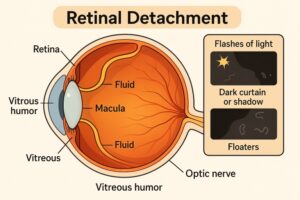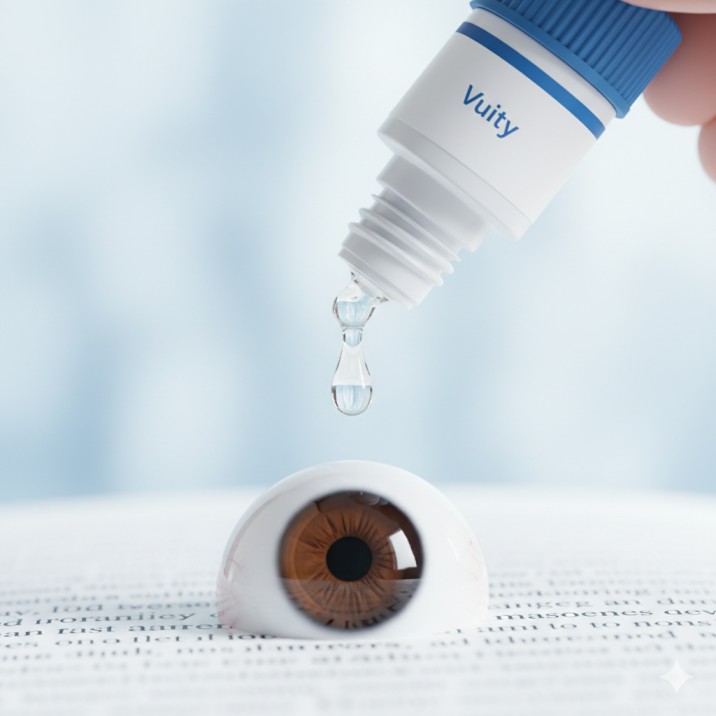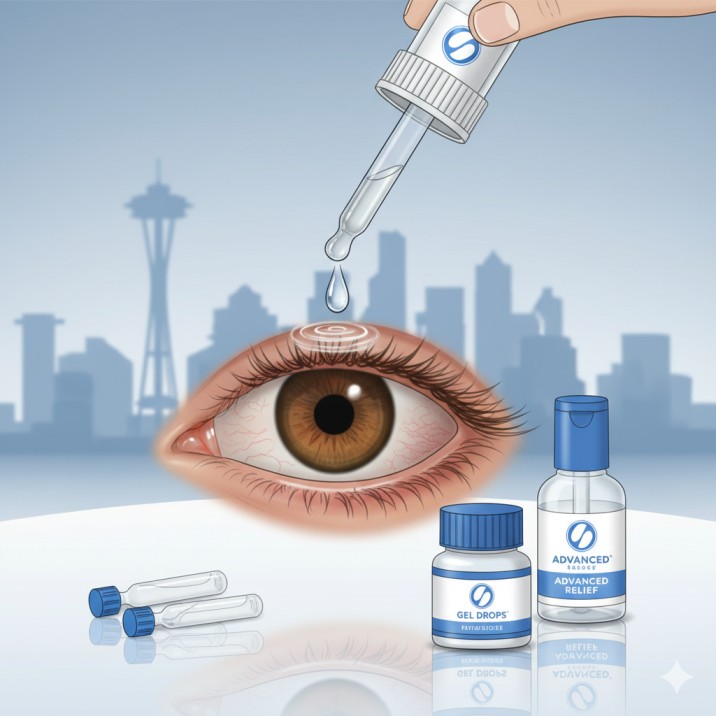Protect Your Vision: Seattle Retinal Emergency Guide

Worried about sudden vision changes? Retinal detachment is a medical emergency that can cause permanent blindness—learn the urgent symptoms, risks, and treatment options every Seattle resident should know.
Key Takeaways: Protecting Vision in Seattle
-
Act Fast on Warning Signs: If you notice sudden flashes, a surge in floaters, or a shadow creeping across your vision, do not delay. These symptoms can signal retinal detachment—an emergency requiring immediate eye care in Seattle.
-
Timing is Vision: Receiving treatment within 48 hours can dramatically improve outcomes. Waiting even a few days increases the risk of irreversible vision loss.
-
Seattle’s Eye Care Advantage: Advanced procedures like pneumatic retinopexy and 25-gauge vitrectomy are available locally, offering high success rates when performed promptly by specialized retinal surgeons.
-
Floaters vs. Flashes—Know the Difference: Floaters alone are common, but when paired with flashes or vision distortion, they signal urgent retinal evaluation. Trust your instincts—if something suddenly looks or feels off, act on it.
-
Children Are at Risk Too: For pediatric patients, subtle symptoms like clumsiness or frequent eye rubbing may point to underlying retinal issues. Seattle’s protocols emphasize early screening and protective eyewear for young athletes.
-
Diabetes Demands Vigilance: Diabetic Seattle residents must prioritize strict glucose control and annual OCT retinal scans. High HbA1c levels increase the likelihood of sight-threatening conditions like diabetic retinopathy and detachment.
-
Recovery Requires Commitment: Post-surgery healing—especially after gas bubble or buckle procedures—demands specific head positioning, limited activity, and adherence to follow-ups at top Seattle institutions like UW Medicine.
-
Support Systems Are in Place: Seattle offers robust resources: from transit services for post-op patients, to vision rehab at Harborview, and affordable eye protection for children via Pro-Optics and REI.
Seattle residents must recognize key retinal detachment symptoms immediately to save their sight. If you experience any of these warning signs, seek emergency eye care in Seattle, WA without delay:
-
Sudden flashes of light
-
A dramatic increase in floaters
-
A shadow or curtain spreading across your vision
-
Blurred or distorted vision
Don’t wait—permanent vision loss can occur rapidly.
What is Retinal Detachment?
Retinal detachment occurs when the retina separates from the eye’s inner wall, requiring emergency eye care in Seattle, WA. While occasional floaters are normal, these sudden changes demand immediate attention:
-
The rapid increase in floaters
-
Flashes of light (like lightning streaks)
-
Vision loss or shadows resembling a descending curtain
-
Blurred or distorted vision Seattle residents experiencing these warning signs need an urgent dilated eye exam with a local optometrist or ophthalmologist. Never delay hoping symptoms improve—permanent vision loss can occur within days.
Critical timing for Seattle patients: When treated within 24-48 hours, outcomes improve dramatically. Waiting even a week often causes irreversible vision damage
What Are Floaters?
Eye floaters are common, particularly among near-sighted individuals in Seattle. Most people notice their first floaters in their 30s-40s, though they can appear earlier. Seattle patients often describe them as:
-
Gnats or amoeba-shaped specks drifting in their vision
-
Objects that dart away when “swatted”
-
Visible in one eye only
-
Moving with eye direction While stable floaters are generally harmless, new or worsening floaters – especially spider-web patterns or veils – require immediate dilated eye exams at Seattle eye clinics.
What Are Flashes?
Flashes of light demand careful evaluation by Seattle eye doctors. We first rule out ocular migraines (neurological, not retinal). True retinal flashes appear as:
-
Lightning bolts or sparks
-
Typically in peripheral vision Critical Seattle alert: When flashes accompany new floaters, emergency dilation is non-negotiable. Reputable Seattle optometrists or ophthalmologists will strongly advocate for immediate dilation – refusal to recommend this for such symptoms raises serious concerns
While retinal tear and detachment treatments vary, one constant remains: Prompt consultation with a retinal surgeon in Seattle, WA is essential after detection during a dilated exam.
Key causes and risk factors include:
-
Head trauma (falls, car accidents)
-
Spontaneous occurrences
-
High myopia (-7.00 prescription or higher)
-
Retinal conditions like lattice degeneration
Advanced Retinal Detachment Surgery in Seattle, WA: Your Treatment Options
With 18 years of managing retinal emergencies in Seattle, I’ve witnessed remarkable surgical advancements at facilities like PNW Retina. Here are the three primary retinal detachment treatments available to Seattle patients:
1. Pneumatic Retinopexy
-
Best for: Small upper retinal tears
-
Seattle clinic advantage: In-office procedure minimizes hospital visits
-
Process: Gas bubble injection + laser repair
-
Recovery: ~3 weeks
-
Local success rate: Highest when treated early
2. Vitrectomy
-
Best for: Complex detachments with vitreous traction
-
Seattle innovation: 25-gauge micro-incision technology reduces scarring
-
Recovery: 4-6 weeks (face-down positioning required)
-
PNW Retina specialty: Advanced membrane peeling techniques
3. Scleral Buckling
-
Best for: Young patients with multiple tears
-
Durability: Silicone band provides lifelong structural support
-
Recovery: Up to 8 weeks for vision stabilization
-
Seattle pediatric focus: Gentle approach for younger eyes
Why timing matters:
Outcomes improve significantly when Seattle residents seek treatment within 48 hours of symptom onset. Consult a retinal specialist in Seattle immediately if experiencing warning signs
Seattle Retinal Surgery Recovery: Your Post-Op Roadmap
Drawing from 127 post-operative cases managed at Cannon EyeCare, here’s your Seattle-specific recovery protocol:
First 72 Hours: Critical Stabilization
-
Head positioning: Maintain as directed (vital for gas bubble procedures)
-
Medication schedule: Antibiotic drops 4x daily
-
Activity restrictions: No bending/lifting >5 lbs
-
Seattle tip: Use grocery delivery services to avoid strain
Weeks 2-4: Gradual Rehabilitation
-
Digital activity: Resume computer work in 20-min intervals
-
Seattle follow-up care: Essential scans at UW Medicine Eye Institute
-
Light exercise: Daily walks boost circulation
-
Local resources: Access Cannon EyeCare’s virtual check-ins
Seattle-Specific Support:
-
Transportation: Sound Transit Access service for medical appointments
-
Vision rehab: Harborview Medical Center’s low-vision programs
-
Urgent concerns: Same-day consultations at Seattle Retina Specialists
Diabetes & Retinal Health: Prevention Strategies for Seattle Residents
Essential Prevention Protocol for Seattle Diabetics:
Based on American Diabetes Association guidelines adapted for King County resources:
1. Metabolic Control
-
HbA1c Target: Maintain <7.0 through:
-
Seattle Nutrition Resources: Diabetes-focused dietitians at Swedish Medical Center
-
Medication Adherence: Free prescription programs at Harborview
-
2. Proactive Screening
-
OCT Scans: Annual exams at King County’s 18 certified clinics
-
UW Medicine Advantage: Medicaid-covered retinal imaging at 7 locations
-
High-Risk Patients: Quarterly scans if HbA1c >8.0
3. Emergency Symptoms Requiring Same-Day Evaluation
Seek immediate care at Seattle Retina Institute if experiencing:
-
A sudden shower of floaters
-
Cobweb-like vision distortions
-
Recurring blurred spots
-
“Curtain effect” peripheral vision loss
Pediatric Retinal Care in Seattle: Protecting Young Eyes
Early Warning Signs Seattle Parents Should Never Ignore:
-
Persistent head tilt during reading or screen use
-
New clumsiness/collisions with objects
-
Excessive eye rubbing (>5x/hour)
-
Key Insight: Seattle’s low-light winters worsen these signs
Seattle-Specific Clinical Protocols:
-
Youth Sports Safety
-
Mandatory myopia screening for WA school athletes
-
Seattle Children’s Hospital concussion-retina guidelines
-
Discounted goggles at Pro-Optics Seattle locations
-
-
Premature Infant Care
-
Strict 8-week ROP follow-ups at UW Medicine NICU
-
Washington State Medicaid coverage for all screenings
-
-
Genetic Risk Management
-
UW Medicine’s Inherited Retina Disease panel
-
Free carrier testing at Seattle Genetics Center
-
Essential Parent Checklist for King County Families:
-
Annual Exams: Dilated retinal scans starting age 5 for high myopia (-4.00+) at Cannon EyeCare
-
Sports Protection:
-
Basketball/Soccer: ANSI-rated goggles from REI Seattle
-
Swimming: UV-blocking swim masks
-
-
Nutrition:
-
Local salmon from Pike Place Market
-
WA-grown sweet potatoes
-
Vitamin D supplements (critical in Seattle winters)
-
Your eyesight is irreplaceable—and when it comes to retinal detachment, every second counts. Whether you’re noticing sudden flashes, new floaters, or a shadow creeping across your vision, don’t wait and hope it gets better. Early detection and prompt treatment in Seattle can make the difference between restored sight and permanent loss.
FAQs
-
What are the first signs of retinal detachment?
Sudden flashes of light, a shower of floaters (like cobwebs or spots), a dark curtain over your vision, or blurred sight. Seek emergency eye care immediately if these occur.
-
How do doctors fix a detached retina?
-
How quickly must retinal detachment be treated?
-
Who is most at risk for retinal detachment?
-
Can retinal detachment heal itself?
-
How can I prevent retinal detachment?
-
What’s the success rate of retinal detachment surgery?
-
Does retinal detachment surgery hurt?
-
How long is recovery after retinal surgery?
-
What happens if a detached retina isn’t treated?




